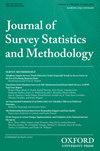Survey Consent to Administrative Data Linkage: Five Experiments on Wording and Format
IF 1.6
4区 数学
Q2 SOCIAL SCIENCES, MATHEMATICAL METHODS
引用次数: 0
Abstract
To maximize the value of the data while minimizing respondent burden, survey data are increasingly linked to administrative records. Record linkage often requires the informed consent of survey respondents and failure to obtain consent reduces sample size and may lead to selection bias. Relatively little is known about how best to word and format consent requests in surveys. We conducted a series of experiments in a probability household panel and an online access panel to understand how various features of the design of the consent request can affect informed consent. We experimentally varied: (i) the readability of the consent request, (ii) placement of the consent request in the survey, (iii) consent as default versus the standard opt-in consent question, (iv) offering additional information, and (v) a priming treatment focusing on trust in the data holder. For each experiment, we examine the effects of the treatments on consent rates, objective understanding of the consent request (measured with knowledge test questions), subjective understanding (how well the respondent felt they understood the request), confidence in their decision, response times, and whether they read any of the additional information materials. We find that the default wording and offering additional information do not increase consent rates. Improving the readability of the consent question increases objective understanding but does not increase the consent rate. However, asking for consent early in the survey and priming respondents to consider their trust in the administrative data holder both increase consent rates without negatively affecting understanding of the request.调查同意行政数据联动:五项措辞与格式实验
为了最大限度地提高数据的价值,同时最大限度地减少受访者的负担,调查数据越来越多地与行政记录挂钩。记录联系通常需要调查受访者的知情同意,未能获得同意会减少样本量,并可能导致选择偏差。对于如何在调查中最好地表达和格式化同意请求,人们知之甚少。我们在概率家庭小组和在线访问小组中进行了一系列实验,以了解同意请求设计的各种特征如何影响知情同意。我们通过实验改变了:(i)同意请求的可读性,(ii)同意请求在调查中的位置,(iii)默认同意与标准的选择加入同意问题,(iv)提供额外信息,以及(v)专注于对数据持有者的信任的启动处理。对于每个实验,我们检查了治疗对同意率、对同意请求的客观理解(用知识测试题衡量)、主观理解(受访者认为他们理解请求的程度)、对自己决定的信心、回答时间以及他们是否阅读了任何附加信息材料的影响。我们发现,默认的措辞和提供额外的信息并不会提高同意率。提高同意问题的可读性可以增加客观理解,但不会增加同意率。然而,在调查的早期征求同意,并促使受访者考虑他们对行政数据持有者的信任,都会提高同意率,而不会对对请求的理解产生负面影响。
本文章由计算机程序翻译,如有差异,请以英文原文为准。
求助全文
约1分钟内获得全文
求助全文
来源期刊
CiteScore
4.30
自引率
9.50%
发文量
40
期刊介绍:
The Journal of Survey Statistics and Methodology, sponsored by AAPOR and the American Statistical Association, began publishing in 2013. Its objective is to publish cutting edge scholarly articles on statistical and methodological issues for sample surveys, censuses, administrative record systems, and other related data. It aims to be the flagship journal for research on survey statistics and methodology. Topics of interest include survey sample design, statistical inference, nonresponse, measurement error, the effects of modes of data collection, paradata and responsive survey design, combining data from multiple sources, record linkage, disclosure limitation, and other issues in survey statistics and methodology. The journal publishes both theoretical and applied papers, provided the theory is motivated by an important applied problem and the applied papers report on research that contributes generalizable knowledge to the field. Review papers are also welcomed. Papers on a broad range of surveys are encouraged, including (but not limited to) surveys concerning business, economics, marketing research, social science, environment, epidemiology, biostatistics and official statistics. The journal has three sections. The Survey Statistics section presents papers on innovative sampling procedures, imputation, weighting, measures of uncertainty, small area inference, new methods of analysis, and other statistical issues related to surveys. The Survey Methodology section presents papers that focus on methodological research, including methodological experiments, methods of data collection and use of paradata. The Applications section contains papers involving innovative applications of methods and providing practical contributions and guidance, and/or significant new findings.

 求助内容:
求助内容: 应助结果提醒方式:
应助结果提醒方式:


